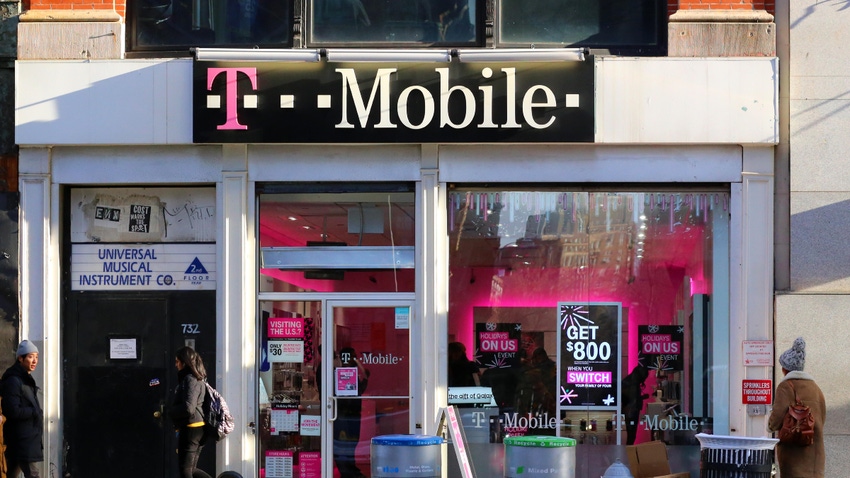T-Mobile: What slowdown?
T-Mobile, in the second quarter of 2023, gained 760,000 new postpaid phone customers, outperforming both AT&T and Verizon during the period.

T-Mobile, in the second quarter of 2023, gained 760,000 new postpaid phone customers, a figure the company said was its best performance in the second quarter in eight years.
The company again raised its expectations for the full year 2023 in terms of customer growth. T-Mobile now expects between 5.6 million and 5.9 million postpaid net customer additions this year, an increase from its guidance of 5.3 million to 5.7 million.
The move comes just months after T-Mobile introduced its new Go5G rate plans.
"If you were wondering how T-Mobile would perform if growth in our category moderated, I think you'll find the answer in our latest results," Mike Sievert, CEO of T-Mobile, said in the company's earnings release. "We are the one to watch – with no plans to slow down."
Verizon earlier this week reported total postpaid phone net customer additions of roughly 8,000 during the second quarter. That figure comprises around 136,000 net customer losses in Verizon's consumer-focused business, offset by 144,000 net customer additions in Verizon's business-focused division. Meanwhile, AT&T reported 326,000 new postpaid phone customers in the second quarter, which is below the 424,000 it reported in the first quarter.
That, according to the financial analysts at Evercore, represents "continued normalization of industry growth." The US wireless industry has been growing at an oversized rate in recent years, and most expect that growth to moderate in the coming months.
"The growth opportunities we've been sharing with you ... really are unique to T-Mobile," Sievert explained during the company's quarterly conference call. The operator expects growth in sectors ranging from fixed wireless to business markets to rural areas.
A big part of T-Mobile's strategy involves offering speedy 5G connections. On that topic, the company's new networking chief – Ulf Ewaldsson – said T-Mobile now covers 285 million people with its midband 2.5GHz network. He said that figure would rise to 300 million by the end of this year.
Moreover, Ewaldsson said T-Mobile has a wide range of additional spectrum resources – from C-band to 3.45GHz to 2.5GHz – to add to its network to improve it. "We have lots of room to move ahead," he said.
Sievert confirmed that T-Mobile is "in discussions" with Dish Network for $3.59 billion worth of 800MHz spectrum licenses. Dish has the option to purchase that spectrum as part of the companies' 2019 agreement. But it's not clear whether Dish will be able to cough up the money necessary to close the transaction.
"We're still waiting on Dish's decision," Sievert explained.
The cable question
During T-Mobile's investor call, Sievert was questioned about T-Mobile's growth in relation to the growth of the nation's cable companies. Cox, Charter Communications and Comcast now offer mobile services through a partnership with Verizon. And Comcast and Charter have recorded significant successes in the effort; Comcast, for example, reported the addition of another 316,000 mobile lines in the second quarter, just below the 317,000 it added in the year-ago quarter.
"There are a lot of brands that have been affected by this," Sievert said, without naming any. "As you can see by our performance, it's not affecting our results."
Sievert said T-Mobile continues to gain ground against the nation's cable companies in terms of the number of customers switching to new providers. Sievert speculated that the cable companies may be gaining new customers from prepaid providers, or from among customers new to the wireless industry. But he said cable companies are not stealing T-Mobile's customers.
"T-Mobile is winning the switching decisions," he said.
Sievert also raised questions about Verizon's wholesale revenues, which is where Verizon records the money it is earning from its cable partners. Verizon's wholesale revenues have remained relatively flat in recent months, even as Comcast and Charter rack up thousands of new mobile customers.
The analysts at New Street Research estimated that 80 percent of Verizon's $618 million in wholesale revenue in the second quarter came from cable companies. The analysts speculated on a variety of reasons why Verizon's wholesale revenues aren't increasing at the same pace that the cable companies are growing their mobile business. They said one possibility is that "cable is offloading an increasing share of traffic to their Wi-Fi networks."
Fixed wireless
T-Mobile added another 509,000 fixed wireless access (FWA) home Internet customers during the second quarter, bringing its FWA customer base to almost 4 million. The company said it remains on track to acquire between 7 million and 8 million FWA customers by 2025.
In its quarterly filings, T-Mobile warned that its FWA growth has been affected by "increased deactivations from a growing customer base." But the company also noted that the situation has been "mostly offset by continued growth in gross additions driven by increasing customer demand."
"It's a great product," said T-Mobile's Mike Katz, the executive leading the operator's FWA business, during T-Mobile's earnings call. "We're really thrilled with where we are with this product."
He also said T-Mobile is seeing declines in its FWA churn figures, which would indicate that customers are increasingly happy with the product.
Related posts:
— Mike Dano, Editorial Director, 5G & Mobile Strategies, Light Reading | @mikeddano
About the Author(s)
You May Also Like












